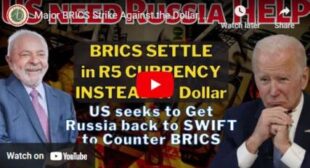
April 12th, UN spokesperson Dujarric announced that the UN was discussing the issue of Russia’s banks being allowed to rejoin the SWIFT payment system. The SWIFT payment system is one of the most crucial financial infrastructures globally.
The War You Don’t See traces the history of ’embedded’ and independent reporting from the carnage of World War I to the destruction of Hiroshima, and from the invasion of Vietnam to the war in Afghanistan. As weapons and propaganda are ever more sophisticated, the very nature of war has developed into an ‘electronic battlefield’. But who is the real enemy today? John Joseph Mearsheimer is an American political scientist and international relations scholar, who belongs to the realist school of thought. He is the R. Wendell Harrison Distinguished Service Professor at the University of Chicago.
He has been described as the most influential realist of his generation. Mearsheimer was born in December 1947 in Brooklyn, New York City. When he was eight, he moved with his family to Croton-on-Hudson, a suburb in Westchester County. When he was 17, Mearsheimer enlisted in the US Army. After one year as an enlisted member, he obtained an appointment to the US Military Academy at West Point, which he attended from 1966 to 1970. After graduation, he served for five years as an officer in the US Air Force. In 1974, while he was in the Air Force, Mearsheimer earned a master’s degree in international relations from the University of Southern California. He entered Cornell University and in 1980 earned a Ph.D. in government, specifically in international relations.
From 1978 to 1979, he was a research fellow at the Brookings Institution in Washington, DC. From 1980 to 1982, he was a postdoctoral fellow at Harvard University’s Center for International Affairs. During the 1998–1999 academic year, he was the Whitney H. Shepardson Fellow at the Council on Foreign Relations in New York. Since 1982, Mearsheimer has been a member of the faculty of the Department of Political Science Faculty at the University of Chicago. He became an associate professor in 1984 and a full professor in 1987 and was appointed the R. Wendell Harrison Distinguished Service Professor in 1996. From 1989 to 1992, he served as chairman of the department.
He also holds a position as a faculty member in the Committee on International Relations graduate program, and he is a co-director of the Program on International Security Policy. Mearsheimer’s books include Conventional Deterrence (1983), which won the Edgar S. Furniss Jr. Book Award; Nuclear Deterrence: Ethics and Strategy (co-editor, 1985); Liddell Hart and the Weight of History (1988); The Tragedy of Great Power Politics (2001), which won the Lepgold Book Prize; The Israel Lobby and U.S. Foreign Policy (2007); and Why Leaders Lie: The Truth About Lying in International Politics (2011).
His articles have appeared in academic journals like International Security and popular magazines like the London Review of Books. He has written op-ed pieces for The New York Times, the Los Angeles Times, and the Chicago Tribune. Mearsheimer has won several teaching awards. He received the Clark Award for Distinguished Teaching when he was a graduate student at Cornell in 1977, and he won the Quantrell Award for Excellence in Undergraduate Teaching at the University of Chicago in 1985. In addition, he was selected as a Phi Beta Kappa Visiting Scholar for the 1993–1994 academic year. In that capacity, he gave a series of talks at eight colleges and universities. In 2003, he was elected to the American Academy of Arts and Sciences.
He is the recipient of the American Political Science Association’s 2020 James Madison Award, which is presented every three years to an American political scientist who has made distinguished scholarly contributions. The Award Committee noted that Mearsheimer is “one of the most cited International Relations scholars in the discipline, but his works are read well beyond the academy as well.” Mearsheimer’s works are widely read and debated[according to whom?] by 21st-century students of international relations. A 2017 survey of US international relations faculty ranks him third among “scholars whose work has had the greatest influence on the field of IR in the past 20 years.”
On April 13th, Brazilian President Luiz Inacio Lula da Silva visited the headquarters of the New Development Bank (NDB) of BRICS countries in Shanghai and attended the inauguration ceremony of Dilma Rousseff, the former Brazilian president, as the new president of the bank. In his speech, Lula questioned why all countries must settle their payments in US dollars and suggested that the NDB could use member countries’ currencies for loans, freeing them from traditional restrictions imposed by developed countries.
Prior to Lula’s visit, China and Brazil had signed an agreement to settle trade in their own currencies. International media saw this as a sign of the beginning of the “de-dollarization” of the world. Lula emphasized on Twitter that “the establishment of the NDB is a milestone in a joint action by emerging countries… Without this bank, the poorest countries will never be able to develop.” On the 13th, Lula visited Huawei. Huawei is a Chinese company that has been suppressed by the United States.
Lula’s visit to Huawei’s innovation center in Shanghai will cause “displeasure” to the United States because the United States believes that Huawei poses a threat to its national security. Lula’s visit to Huawei demonstrates Brazil’s attitude of not joining the United States in containing China’s attempts. Especially since the United States regards Huawei as its “main threat,” Lula’s visit to the company will undoubtedly upset the United States.
Will China End US Global Hegemony?
The Future of Our Multipolar World
China And Russia JUST SHOCKED The World With Their NEW MEGA Gas Pipeline
